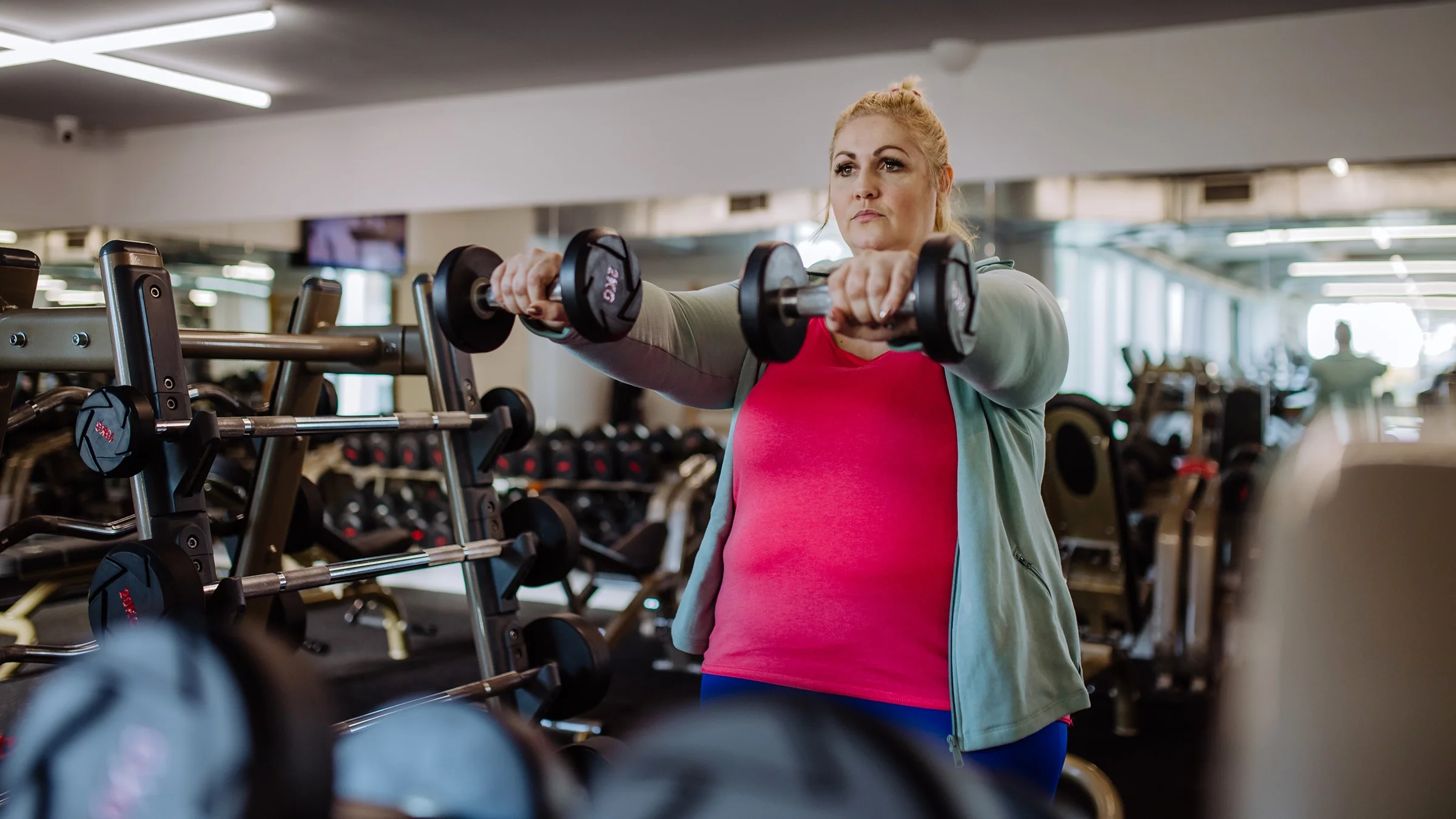Have you ever wondered why losing weight feels harder for you than it does for men? You’re not alone.
Many women notice that their weight drops slower, even when they follow the same diet and exercise routine as men. Understanding the reasons behind this can change how you approach your weight loss journey and help you find smarter, more effective strategies.
Keep reading, because what you’re about to learn could be the key to unlocking your progress and finally seeing the results you deserve.

Biological Differences
Men and women lose weight at different speeds due to biology. These differences affect how the body burns fat and builds muscle.
Understanding these biological factors helps explain why weight loss can be slower for women than men.
Hormonal Impact On Weight Loss
Hormones control many body functions, including weight loss. Women have different hormone levels than men, which affects fat burning.
For example, higher estrogen levels in women can slow down fat loss. Hormone changes during menstrual cycles also impact weight.
- Estrogen promotes fat storage, especially around hips and thighs
- Progesterone can cause water retention, affecting weight
- Men have more testosterone, which helps build muscle
Muscle Mass And Metabolism
Muscle burns more calories than fat, even when resting. Men usually have more muscle mass than women.
This means men have a higher metabolism, so they burn calories faster and lose weight quicker.
- More muscle leads to higher calorie burn
- Women tend to have more body fat than muscle
- Lower muscle mass slows down women’s metabolism
Fat Distribution Patterns
Men and women store fat in different places. Women often carry fat around hips and thighs, while men store it in the belly.
Fat in certain areas can be harder to lose, which affects how fast weight loss happens.
- Women have more subcutaneous fat under the skin
- Men have more visceral fat around organs, easier to burn
- Fat distribution affects how the body uses energy

Metabolic Rate Variations
Men and women often lose weight at different speeds. One key reason is how their bodies use energy. Metabolic rate plays a big part in this.
Metabolic rate means how fast the body burns calories. Differences in this rate affect weight loss for men and women.
Basal Metabolic Rate In Men Vs Women
Basal Metabolic Rate (BMR) is the calories the body burns at rest. Men usually have a higher BMR than women.
This difference happens because men have more muscle mass. Muscle burns more calories than fat, even when resting.
- Men’s muscles burn more calories at rest
- Women tend to have higher body fat percentage
- Higher muscle mass raises BMR
- Lower muscle mass means slower calorie burn in women
Energy Expenditure Differences
Energy expenditure is the total calories burned daily. Men often burn more calories through activity than women.
Men usually have larger bodies and more muscle. This makes them use more energy during exercise and daily tasks.
- Men burn more calories during physical activity
- Women may have lower energy use for the same activity
- Daily tasks use more energy in men due to body size
- Lower energy expenditure can slow weight loss in women
Role Of Hormones
Hormones play a big part in how men and women lose weight. They control many body functions like fat storage and muscle growth. Women’s hormone levels change often, which affects weight loss speed.
Men and women have different hormone balances. This difference can make women lose weight slower than men. Understanding these hormones helps explain why.
Effects Of Estrogen And Progesterone
Estrogen and progesterone are the main female hormones. They affect how the body stores fat and burns calories. Estrogen helps keep fat in certain areas like hips and thighs.
These hormones also change during the menstrual cycle. This causes shifts in hunger and energy use. Sometimes women may feel hungrier or have less energy for exercise.
- Estrogen promotes fat storage in hips and thighs
- Progesterone can increase appetite
- Hormone changes affect metabolism speed
- Fat stored is harder to burn during certain cycle phases
Testosterone’s Influence On Muscle Growth
Testosterone is higher in men than women. It helps build and maintain muscle mass. Muscle burns more calories, even at rest.
Women have lower testosterone levels. This means they build muscle slower. Less muscle means a lower calorie burn, which slows weight loss.
- Testosterone boosts muscle growth
- More muscle leads to faster calorie burning
- Women’s lower testosterone slows muscle gain
- Lower muscle mass reduces weight loss speed
Lifestyle And Behavioral Factors
Women often lose weight slower than men due to lifestyle and behavior. These factors affect how the body uses energy.
Understanding these habits helps explain the weight loss difference between men and women.
Dietary Habits And Caloric Intake
Women usually eat fewer calories than men. This lower intake can slow weight loss.
Women may choose different foods that affect metabolism and energy use.
- Women tend to eat smaller meals and snacks.
- Some prefer foods with lower protein and fat.
- Calorie needs are often lower for women.
Exercise Preferences And Intensity
Women may choose gentler workouts than men. This affects how many calories they burn.
Men often do higher-intensity exercises that burn more energy faster.
- Women often prefer activities like yoga and walking.
- Men often do weight lifting and sprinting.
- Higher intensity exercise helps burn more calories.
Psychological And Social Influences
Weight loss can be affected by more than just diet and exercise. Psychological and social factors also play a big role. These influences can make it harder for women to lose weight quickly.
Understanding these factors helps explain why women often lose weight slower than men. Stress, emotions, and social pressures all impact weight loss differently for women.
Stress And Emotional Eating
Stress affects the body in many ways. Women often feel more stress from daily responsibilities. This can lead to emotional eating, where food is used for comfort.
Emotional eating usually involves high-calorie, sugary, or fatty foods. These foods can slow down weight loss. Stress also raises cortisol levels, which can increase fat storage.
- Stress causes cravings for unhealthy foods
- Cortisol hormone encourages fat storage
- Emotional eating adds extra calories
- Women may face more social stressors
Societal Expectations And Body Image
Society often sets strict beauty standards for women. These standards can cause pressure and low self-esteem. Feeling bad about their bodies can affect motivation to lose weight.
Women may try fad diets or extreme plans to meet these expectations. These methods are hard to maintain and can slow progress. The focus on appearance can also create anxiety around food and exercise.
- Pressure to look a certain way is high
- Body dissatisfaction can lower motivation
- Unhealthy dieting may harm progress
- Social comparison increases stress

Scientific Studies And Findings
Many studies explore why women lose weight slower than men. Scientists look at body differences, hormones, and metabolism.
This research helps explain the challenges women face during weight loss. It shows how biology affects results.
Key Research On Gender And Weight Loss
One study found men burn more calories at rest than women. This is because men usually have more muscle mass.
Women tend to store more fat for biological reasons, which makes weight loss slower. Hormones like estrogen also play a role.
- Men have higher basal metabolic rates (BMR)
- Women have more body fat for reproductive health
- Testosterone in men boosts muscle growth
- Estrogen in women affects fat storage
Surprising Insights From Recent Experiments
Recent experiments show women’s bodies may resist losing fat faster. This is to protect energy for pregnancy and breastfeeding.
Researchers also found women burn more fat during exercise but fewer total calories. Men burn more calories overall, aiding faster weight loss.
- Women burn fat more efficiently but fewer calories
- Men burn more calories even at rest and during exercise
- Women’s fat loss slows down due to energy conservation
- Weight loss plans may need to differ by gender
Strategies For Effective Weight Loss
Women often lose weight slower than men. This happens because of body differences and hormones. Using smart strategies helps women reach their goals.
Understanding what works best for women can make weight loss easier. Here are two key strategies to try.
Tailored Diet Plans For Women
Women need diets that fit their unique body needs. Their metabolism and hormones affect how they burn calories. A diet with the right balance of nutrients helps.
Eating enough protein supports muscle and keeps hunger low. Healthy fats and fiber improve energy and digestion. Smaller, frequent meals can keep metabolism steady.
- Include lean proteins like chicken, fish, or beans
- Add healthy fats such as nuts, seeds, and avocados
- Eat plenty of vegetables and whole grains for fiber
- Drink water and avoid sugary drinks
- Limit processed foods and high sugar snacks
Optimizing Workouts For Female Physiology
Women’s bodies respond well to workouts that match their physiology. Combining strength training with cardio helps burn fat and build muscle. Muscle boosts metabolism.
Workouts should allow enough rest to avoid injury. Mixing different exercises keeps the routine fun and effective. Focus on consistency over intensity.
- Do strength training 2-3 times a week
- Add cardio exercises like walking, cycling, or swimming
- Include flexibility and balance moves like yoga or stretching
- Rest on days between intense workouts
- Track progress to stay motivated
Frequently Asked Questions
Why Do Women Burn Fewer Calories Than Men?
Women generally have less muscle mass than men, leading to slower calorie burning. Muscle tissue burns more calories at rest, so men naturally have a higher metabolic rate, making weight loss faster for them.
How Do Hormones Affect Women’s Weight Loss Speed?
Hormones like estrogen and progesterone influence fat storage and metabolism. Women’s hormonal fluctuations can slow down fat burning, especially around menstrual cycles, making weight loss slower compared to men.
Does Body Composition Impact Weight Loss Differences?
Yes, men usually have more lean muscle, while women carry more body fat. This difference means men burn calories faster, which helps them lose weight quicker than women under similar conditions.
Can Metabolism Explain Slower Weight Loss In Women?
Women typically have a slower basal metabolic rate (BMR) than men. A slower BMR means women burn fewer calories at rest, which can contribute to slower weight loss despite similar efforts.
Conclusion
Understanding weight loss differences helps set realistic goals. Women face unique challenges. Hormonal shifts, muscle mass, and metabolism influence weight loss speed. Men typically have more muscle, which burns calories faster. Women should focus on balanced diets and regular exercise.
Patience and persistence are key. Celebrate small victories along the journey. Support and motivation play crucial roles. Remember, every body is different. Embrace your own pace. Prioritize health over numbers on a scale. Achieving a healthy lifestyle is a marathon, not a sprint.
Stay positive. Keep moving forward. Your journey matters.



